The Patna High Court has dismissed a Letters Patent Appeal filed by a public sector undertaking against a Single Judge’s order that had quashed a departmental penalty imposed on a company officer. The Division Bench—led by Hon’ble the Chief Justice and Hon’ble Mr. Justice Partha Sarthy—affirmed that the disciplinary conclusion against the employee rested on “no evidence” and therefore could not stand in judicial review. The judgment, dated 07-01-2025, arises from LPA No. 495 of 2024 and upholds the Single Judge’s order of 15-04-2024 in CWJC No. 2607 of 2019.
Simplified Explanation of the Judgment
This case concerns an internal event organised by a public sector oil company in 2009 to distribute golden jubilee medallions to retired employees. The aggrieved person (the writ petitioner before the Single Judge) was posted in the Eastern Regional Office at Kolkata and, along with two other staff members, manned “Counter No. 2” for distribution. Several years later, a departmental chargesheet was issued in November 2013 alleging (i) failure to maintain a counter-wise statement of the medallions taken out and returned to the safe, (ii) failure to supervise the two other personnel at the counter, and (iii) consequential contribution to misappropriation of 250 grams of gold medallions valued at ₹4,56,000 (as per internal valuation).
A full departmental enquiry followed. On the management side seven witnesses and twelve documents were produced; the employee produced one witness and seven exhibits. The Inquiry Officer’s report dated 24-12-2015 held only one aspect “partially proved”: that the officer, being the senior-most at the counter, ought to have persuaded teammates to prepare a handing-over/taking-over (HOTO) record for the medallions received, distributed and returned. Crucially, the Inquiry Officer found the other two charges—about supervision and alleged contribution to misappropriation—“not proved” and “not tenable”, noting the absence of a fool-proof system or formal guidelines for the distribution exercise.
Despite this, the Disciplinary Authority imposed a monetary penalty of ₹50,000 by order dated 31-01-2017, which the Appellate Authority affirmed on 20-07-2017; the Review Petition was also rejected on 21-09-2017. The employee challenged these orders in writ proceedings, and the learned Single Judge allowed the writ on 15-04-2024—quashing the penalty. The employer appealed in LPA.
Before the Division Bench, the appellant (employer) argued that the employee had been negligent, including allegedly leaving the counter midway and failing to maintain a statement of receipts/returns. They relied on Supreme Court decisions—B.C. Chaturvedi v. Union of India (1995) 6 SCC 749 and Union of India v. P. Gunasekaran (2015) 2 SCC 610—to contend that High Courts should not re-appreciate evidence in disciplinary matters.
The Division Bench carefully examined the enquiry material and highlighted a key omission: neither of the two colleagues who shared Counter No. 2 with the employee were examined by the management, even though one of them had a set of keys and could independently open the vault. This was significant because the charges were tied to how the counter functioned and how the medallions moved. The Inquiry Officer himself had recorded that there was no documentary proof that the employee was counter supervisor/in-charge, and also noted the absence of a structured procedure or briefing for the event.
In short, the Bench treated this as a “no evidence” case with respect to the core allegations. Where the charges of supervision failure and contribution to misappropriation were expressly found “not proved,” the residual, partial observation that the officer “should have motivated” team members to prepare a HOTO record could not, on its own, justify a penalty—especially when the organisation had not issued clear instructions or a standard operating procedure for the distribution.
On the law, the Bench reiterated that while the High Court ordinarily does not re-assess evidence in disciplinary matters, it can interfere when findings are based on “no evidence.” The Division Bench anchored this conclusion by referring to its own earlier decision in The State of Bihar & Ors. v. Vikash Kumar @ Vikas Kumar (LPA No. 446 of 2024), which had quoted the Supreme Court in P. Gunasekaran on the narrow grounds of judicial review, and also explained when remand is appropriate (e.g., where the enquiry report wasn’t supplied, per Mohd. Ramzan Khan and ECIL v. B. Karunakar).
Applying these principles, the Court held there was no legal basis to upset the Single Judge’s decision. The LPA was dismissed, and the penalty remained quashed.
Significance or Implication of the Judgment
For public authorities and PSUs, this decision is a reminder that disciplinary findings must rest on cogent evidence, especially where multiple persons were involved in the relevant process. If critical witnesses are not examined and procedural roles are unclear, punitive orders are vulnerable. The Bench’s emphasis on the “no evidence” exception within judicial review ensures fairness: High Courts will not re-weigh evidence like an appellate forum, but they will step in when disciplinary conclusions lack a factual substrate.
For employees, the ruling underscores that liability cannot be inferred from mere seniority at a workplace counter or from vague expectations of “supervision,” absent proof of a designated role and clear instructions from the employer. Where the internal system itself lacks SOPs, courts are unlikely to sustain penalties premised on supposed omissions (like not preparing HOTO statements) unless the employer proves duty allocation and communicates procedures.
Legal Issue(s) Decided and the Court’s Decision with Reasoning
- Whether the High Court can interfere with disciplinary findings in writ jurisdiction
Held: Yes—where findings are based on “no evidence.” The Court relied on the settled P. Gunasekaran framework: writ courts don’t re-appreciate evidence but may interfere if the finding of fact is unsupported by any legal evidence. - Whether the penalty could stand when two critical counter colleagues weren’t examined and no supervisor role was proved
Held: No. Non-examination of the two colleagues and the absence of any instruction making the employee supervisor/in-charge made it a no-evidence case on supervision and causation. - Effect of organisational lapses (absence of SOP/briefing) on attributing negligence
Held: Where the organisation had not issued clear guidelines or a structured process, a partial observation that the employee “should have motivated” teammates to prepare records cannot justify penalty. - Appropriate standard of proof in departmental enquiries
Reiterated: The standard is preponderance of probability, but that still requires some evidence. If the record is devoid of material linking the employee to misconduct, courts will not sustain peremptory findings. - Outcome of the employer’s appeal
Held: Appeal dismissed; Single Judge’s order quashing the ₹50,000 penalty affirmed.
Judgments Referred by Parties
- B.C. Chaturvedi v. Union of India, (1995) 6 SCC 749 — relied upon by appellant to argue limits of judicial review.
- Union of India v. P. Gunasekaran, (2015) 2 SCC 610 — relied upon by appellant to oppose re-appreciation of evidence.
Judgments Relied Upon or Cited by Court
- Union of India v. P. Gunasekaran, (2015) 2 SCC 610 — extracted to set the narrow grounds for writ interference, including the “no evidence” rule.
- Union of India v. Mohd. Ramzan Khan, (1991) 1 SCC 588 — on supply of enquiry report and natural justice (contextual reference).
- ECIL v. B. Karunakar, (1993) 4 SCC 727 — reaffirming Ramzan Khan; when remand is warranted.
- The State of Bihar & Ors. v. Vikash Kumar @ Vikas Kumar, LPA No. 446 of 2024 (Patna High Court) — Division Bench precedent clarifying that writ interference is justified where findings rest on no evidence.
Case Title
Indian Oil Corporation Limited & Ors. v. Smt. Veena Kumari
Case Number
Letters Patent Appeal No. 495 of 2024; arising out of CWJC No. 2607 of 2019.
Coram and Names of Judges
Hon’ble the Chief Justice; Hon’ble Mr. Justice Partha Sarthy.
Names of Advocates and who they appeared for
- Dr. K.N. Singh, Senior Advocate; Mr. Ankit Katriar, Advocate — for the appellant (employer).
- Counsel for respondent — not indicated in the provided copy.
Link to Judgment
MyM0OTUjMjAyNCMxI04=-WNdSFJFSqSw=
If you found this explanation helpful and wish to stay informed about how legal developments may affect your rights in Bihar, you may consider following Samvida Law Associates for more updates.








